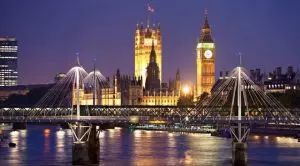 UK bookmakers could be set for a £1-billion value-added tax (VAT) refund following a court ruling, according to which they were wrongly imposed a VAT on the revenue generated from fixed-odds betting terminals (FOBTs).
UK bookmakers could be set for a £1-billion value-added tax (VAT) refund following a court ruling, according to which they were wrongly imposed a VAT on the revenue generated from fixed-odds betting terminals (FOBTs).
The ruling of the First-tier Tribunal Tax Chamber brought the case started by the high-street bookmaker Betfred against HM Revenue & Customs (HMRC) to an end, marking a grand victory for the local gambling sector at a time when the British Government has already announced its decision to reduce the maximum bet allowed on the controversial machines from £100 to £2.
Now, the tax tribunal issues a ruling that the principle of fiscal neutrality was violated by VAT collection on FOBTs revenue in the period from 2005 to 2013. As highlighted by the tribunal, the revenue of similar roulette-style games available both in land-based casinos and on gambling websites was not affected by the tax.
It still remains unclear whether the HMRC would appeal the ruling. In case that the UK Government’s non-ministerial department does not appeal or a potential appeal turns out to be unsuccessful, the expected refund would most likely amount to at least £1 billion. According to sources close to the matter, Betfred alone could claim back about £100 million.
The ruling of the First-tier Tax Tribunal Chamber is not a precedent. Back in 2016, Sportech managed to win over the tax body in a long-running battle to claim back VAT amounting to £97 million after a court battle running for almost eight years.
New FOBT Rules Delay Would Help Treasury Offset Ruling’s Impact
 Originally, fixed-odds betting machines were subject to a betting tax at a 15% rate. Then, in 2005 a value-added tax was imposed and eight years later, in 2013, it was replaced by a machine games duty (MGD) at 20% rate, with that rate subsequently being raised to 25%.
Originally, fixed-odds betting machines were subject to a betting tax at a 15% rate. Then, in 2005 a value-added tax was imposed and eight years later, in 2013, it was replaced by a machine games duty (MGD) at 20% rate, with that rate subsequently being raised to 25%.
Previously, campaigners have made speculations about Betfred’s chances of winning the case considering the decision of the HM Treasury to delay the implementation of the new FOBTs regulation until April 2020 in order to offset possible losses for the industry. The postponement was greatly criticised by anti-gambling campaigners who claimed that the 2-year period given to UK bookmakers to adapt to the new regulation. However, it became clear that the Treasury is already making plans to compensate for the loss of tax revenue generated by FOBTs by increasing the online gambling taxes.
Considering the recent decision of the First-tier Tribunal Tax Chamber, the delay of the new regulatory measures which are to be imposed on fixed-odds betting machines would provide HM Treasury with the chance to soften the effect of the expected rebate. Of course, local bookmakers are expected to be the actual winners not only from the tribunal’s ruling, but also from the delay, because they would not only be able to get a refund for the taxes they paid from 2005 to 2013, but also by the delay as it would allow them to still generate FOBTs revenue in the period to April 2020.
- Author


